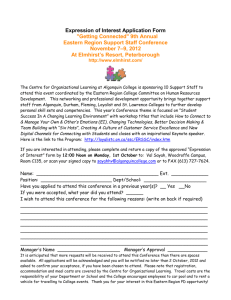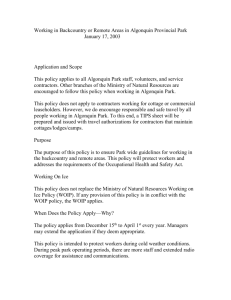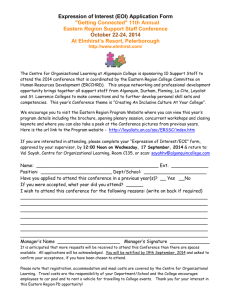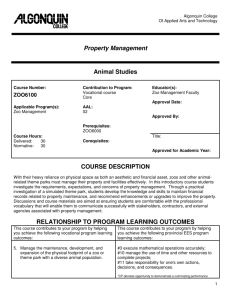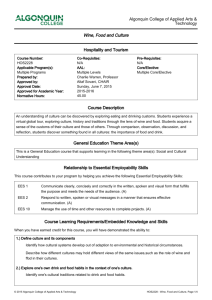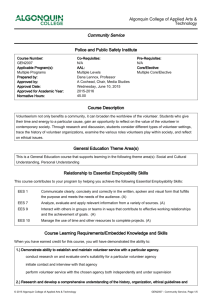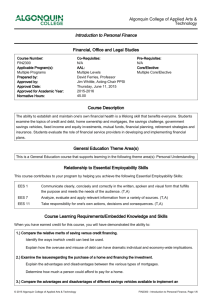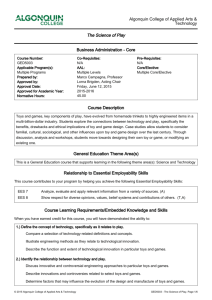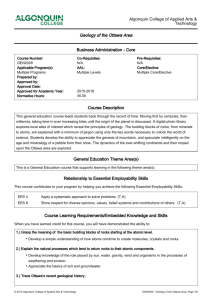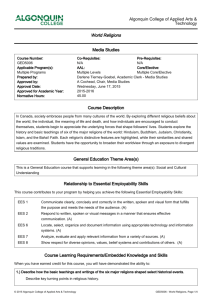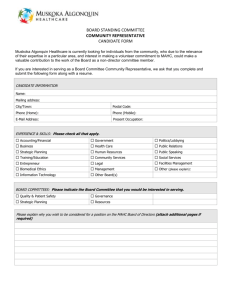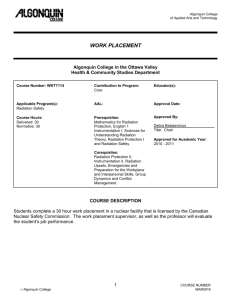Course Outline
advertisement
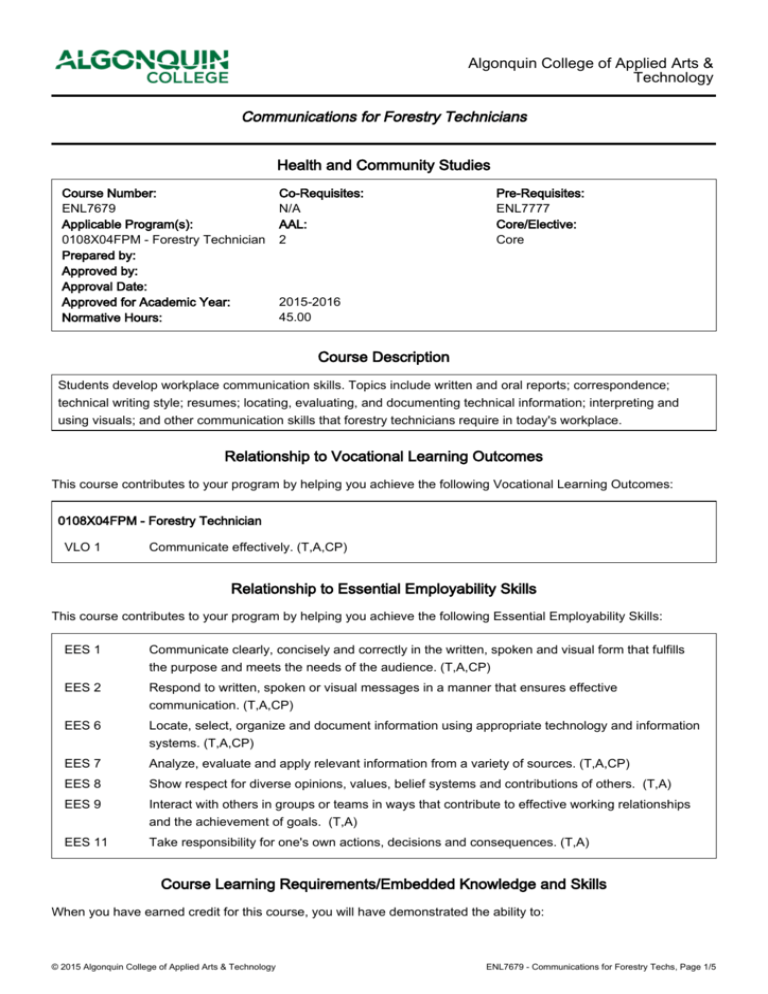
Algonquin College of Applied Arts & Technology Communications for Forestry Technicians Health and Community Studies Course Number: ENL7679 Applicable Program(s): 0108X04FPM - Forestry Technician Prepared by: Approved by: Approval Date: Approved for Academic Year: Normative Hours: Co-Requisites: N/A AAL: 2 Pre-Requisites: ENL7777 Core/Elective: Core 2015-2016 45.00 Course Description Students develop workplace communication skills. Topics include written and oral reports; correspondence; technical writing style; resumes; locating, evaluating, and documenting technical information; interpreting and using visuals; and other communication skills that forestry technicians require in today's workplace. Relationship to Vocational Learning Outcomes This course contributes to your program by helping you achieve the following Vocational Learning Outcomes: 0108X04FPM - Forestry Technician VLO 1 Communicate effectively. (T,A,CP) Relationship to Essential Employability Skills This course contributes to your program by helping you achieve the following Essential Employability Skills: EES 1 Communicate clearly, concisely and correctly in the written, spoken and visual form that fulfills the purpose and meets the needs of the audience. (T,A,CP) EES 2 Respond to written, spoken or visual messages in a manner that ensures effective communication. (T,A,CP) EES 6 Locate, select, organize and document information using appropriate technology and information systems. (T,A,CP) EES 7 Analyze, evaluate and apply relevant information from a variety of sources. (T,A,CP) EES 8 Show respect for diverse opinions, values, belief systems and contributions of others. (T,A) EES 9 Interact with others in groups or teams in ways that contribute to effective working relationships and the achievement of goals. (T,A) EES 11 Take responsibility for one's own actions, decisions and consequences. (T,A) Course Learning Requirements/Embedded Knowledge and Skills When you have earned credit for this course, you will have demonstrated the ability to: © 2015 Algonquin College of Applied Arts & Technology ENL7679 - Communications for Forestry Techs, Page 1/5 1.) Plan and prepare organized and complete work-related documents, which are tailored to intended audiences, expressed in clear, concise coherent English prose, and presented in the appropriate format. • plan, organize, and present communication according to purpose and audience • write and illustrate technical documents with an effective and professional layout • select and use style, tone, and vocabulary appropriate to a message, its situation, and its audience • revise to improve structure, tone, content, and ensure that material is free from mechanical errors • use appropriate technology to effectively convey technical information 2.) Respond to written, spoken, or visual messages in a manner that ensures effective communication • summarize and evaluate technical information • reframe original message in other formats (e.g. converting a text message to a visual one) 3.) deliver organized and complete spoken messages which effectively convey technical information • plan and present an effective presentation which professionally conveys information • plan and prepare effective visuals, including PowerPoint, and integrate them smoothly into a presentation • respect time allocations in presentations • use appropriate verbal and non-verbal cues to effectively convey information verbally • respect conventions of standard English in presentations • contribute your own ideas, opinions, and information while at the same time demonstrating respect for • those of others respond knowledgeably and confidently to audience questions 4.) Locate, select, and evaluate relevant technical information from a variety of sources • gather and select appropriate technical information from a variety of sources including the Internet and • • • online databases document sources of information correctly, using APA format critically evaluate information integrate and explain information to meet the needs of the message, purpose and audience 5.) Represent your skills, knowledge and experience realistically for employment purposes • summarize personal skills, knowledge and expeprience • plan and prepare an effective cover letter • prepare for a succesful job interview Learning Resources Searles, G.M., & Moran, K.M. (2012). Workplace communications: The basics (Can. ed.). Toronto, ON: Pearson. MyWritingLab (Pearson) Learning Activities Class presentations Lectures Discussions (online and in classroom) Planning, writing, revising, and editing written work Using information technology Reading assigned material Consultation meetings with your professor © 2015 Algonquin College of Applied Arts & Technology ENL7679 - Communications for Forestry Techs, Page 2/5 Completing any additional assignments that may be required to demonstrate learning outcomes Evaluation/Earning Credit The following list provides evidence of this course's learning achievements and the outcomes they validate: Prior Learning Assessment and Recognition Students who wish to apply for prior learning assessment and recognition (PLAR) need to demonstrate competency at a post-secondary level in all of the course learning requirements outlined above. Evidence of learning achievement for PLAR candidates includes: • Portfolio Grade Scheme Final Grade Mark Equivalent Numeric Value Final Grade Mark Equivalent Numeric Value A+ 90% - 100% 4.0 A 85% - 89% 3.8 A- 80% - 84% 3.6 B+ 77% - 79% 3.3 B 73% - 76% 3.0 B- 70% - 72% 2.7 C+ 67% - 69% 2.3 C 63% - 66% 2.0 C- 60% - 62% 1.7 D+ 57% - 59% 1.4 D 53% - 56% 1.2 D- 50% - 52% 1.0 F 0% - 49% 0 FSP 0 0 Course Related Information Policy Regarding Missed Tests/In Class Assignments & Late Assignments 1. Missed Tests/ In class Assignments A make-up opportunity may be available, if extenuating circumstances* exist, and the student notifies the professor ahead of time. 2. Late Assignments Unless the student has requested and received an extension, a ten percent (10%) penalty mark will be deducted per day, for five calendar days. After that time, the assignment will receive a zero grade. 3. Lateness for Tests and In-class Assignments A student who is late for class and arrives after another student has submitted a test/in-class assignment and has left the classroom, will not be eligible to write the test or complete the assignment. * Extenuating circumstances may be defined as unforeseeable, unpreventable events such as personal illness, serious illness of a close family member, motor vehicle accident, or other emergency. Appropriate documentation may be required. College Related Information © 2015 Algonquin College of Applied Arts & Technology ENL7679 - Communications for Forestry Techs, Page 3/5 Email Algonquin College provides all full-time students with an e-mail account. This is the address that will be used when the College, your professors, or your fellow students communicate important information about your program or course events. It is your responsibility to ensure that you know how to send and receive e-mail using your Algonquin account and to check it regularly. Students with Disabilities If you are a student with a disability, it is strongly recommended that you identify your needs to your professor and the Centre for Students with Disabilities (CSD) or Student Services, by the end of the first month of the semester in order that necessary accommodations or support services can be arranged for you. Academic Integrity & Plagiarism Adherence to acceptable standards of academic honesty is an important aspect of the learning process at Algonquin College. Academic work submitted by a student is evaluated on the assumption that the work presented by the student is his or her own, unless designated otherwise. For further details consult Algonquin College Policies AA18: Academic Dishonesty and Discipline and AA20: Plagiarism Student Course Feedback It is Algonquin College’s policy to give students the opportunity share their course experience by completing a student course feedback survey for each course they take. For further details consult Algonquin College Policy AA25: Student Course Feedback Use of Electronic Devices in Class With the proliferation of small, personal electronic devices used for communications and data storage, Algonquin College believes there is a need to address their use during classes and examinations. During classes, the use of such devices is disruptive and disrespectful to others. During examinations, the use of such devices may facilitate cheating. For further details consult Algonquin College Policy AA32: Use of Electronic Devices in Class Transfer of Credit It is the student’s responsibility to retain course outlines for possible future use to support applications for transfer of credit to other educational institutions. Note: It is the student’s responsibility to refer to the Algonquin College Policies website for the most current information at http://www.algonquincollege.com/directives/ Legend Terms •ALO: Aboriginal Learning Outcome •Apprenticeship LO: Apprenticeship Learning Outcome •CLR: Course Learning Requirement •DPLO: Degree Program Learning Outcome •EES: Essential Employability Skill •EOP: Element of Performance •GELO: General Education Learning Outcome •LO: Learning Outcome •PC: Program Competency •PLA: Prior Learning Assessment •PLAR: Prior Learning Assessment and Recognition •VLO: Vocational Learning Outcome © 2015 Algonquin College of Applied Arts & Technology ENL7679 - Communications for Forestry Techs, Page 4/5 Assessment Levels •T: Taught •A: Assessed •CP: Culminating Performance © 2015 Algonquin College of Applied Arts & Technology ENL7679 - Communications for Forestry Techs, Page 5/5
